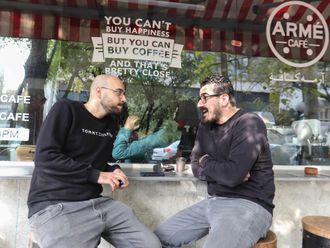Manama: A Lebanese military court has sentenced a Kuwaiti, a Syrian and a Tajikistani to life in prison for allegedly belonging to Al Qaeda and forming a terrorist cell to carry out attacks on United Nations Interim Force (UNIFIL) in Lebanon.
The cell also planned to start a new mode of operations by disregarding traditional logistics support to local groups and move towards turning Lebanon into an open ground for jihad activities, Lebanese media said.
According to the court papers, Mohammad Abdullah Nasser Al Dossari, from Kuwait, Samir Hajazi from Syria and Mohammad Tiyarov from Tajikistan, coordinated with extremists from the Fatah Al Islam and Jund Al Sham organizations at meetings in Syria and in the Ain Al Hilweh camp in Lebanon to collect money and weapons and plan terrorist activities in Lebanon and against the regime in Syria, Lebanese media said.
Al Dossari, nicknamed Abu Talha, was arrested at Beirut airport on December 4, 2009 while trying to enter the country using a fake Moroccan passport. His two accomplices were arrested later in Beirut.
Al Dossari had been arrested in his country in 2000 and held for seven years. He later moved to Syria before going into hiding.
Intelligence reports say that he crossed into Iran and then Afghanistan, before reappearing in Lebanon by the end of the year. Al Hijazi has reportedly worked with Al Qaeda in Iraq, Syria, while Tiyarov operated in Afghanistan.
According to the Lebanese media, the Dossari cell had connections with Al Qaeda and wanted to set up a post in Lebanon to launch attacks on UNIFIL in southern Lebanon. The meetings at Ein El Helweh with leaders from Fatah Al Islam and Jund Al Sham were part of the attack plans.
The Lebanese security authorities are still looking for a fourth member of the group under the name of Ahmad Khalid Al Darweesh who is reportedly hiding in a Palestinian camp.
Citing unnamed sources probing the case, Al Akhbar daily said that the investigations revealed that Al Dossari cell were the first group to seek the establishment of an organization that would be different from the ones based in Syria and Iraq.
Under the new strategy, operations would move from the traditional offer of logistic support to local Al Qaida-linked groups to turning Lebanon into an open field for jihad activities.
The UNIFIL was created by the Security Council in March 1978 to “confirm Israeli withdrawal from Lebanon, restore international peace and security and assist the Lebanese Government in restoring its effective authority in the area.”
However, following the July/August 2006 crisis, the Council enhanced the Force and decided that in addition to the original mandate it would also “monitor the cessation of hostilities, accompany and support the Lebanese armed forces as they deploy throughout the south of Lebanon and extend its assistance to help ensure humanitarian access to civilian populations and the voluntary and safe return of displaced persons.”












